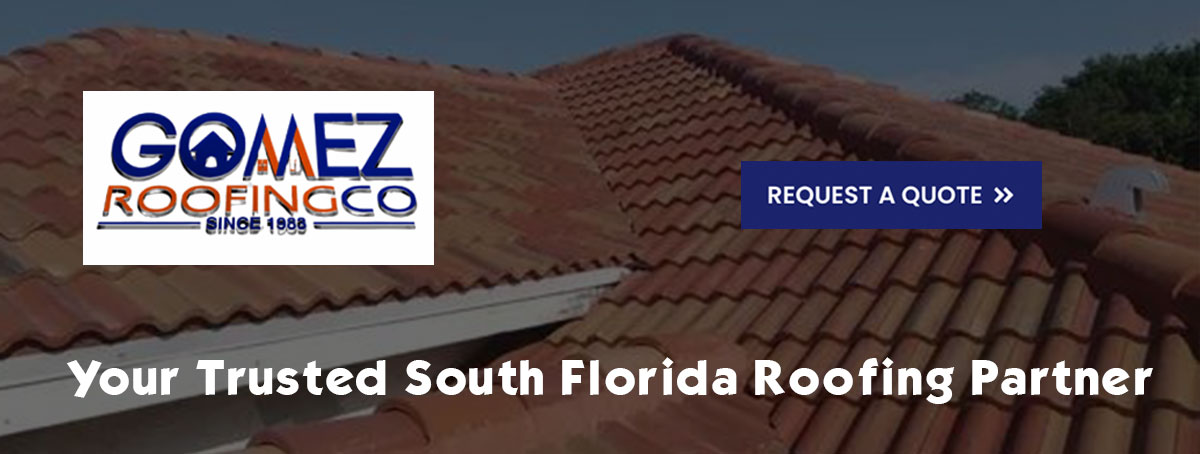Table Of Contents:
- What Is a Roofing Warranty and Why Is It Important?
- How Do Roofing Warranties Provide Peace of Mind to Homeowners?
- What Should You Look for When Choosing a Roofing Contractor in Pompano Beach?
- How Can Extended Roofing Warranties Maximize Your Roof’s Lifespan?
- How Do You File a Roofing Warranty Claim in Pompano Beach?
- What Are the Most Common Questions About Roofing Warranties?
- How Do Roofing Warranties Offer a Competitive Advantage in Pompano Beach?
- Frequently Asked Questions
Roofing is one of the most significant investments for any homeowner. A durable roof not only provides structural protection against the elements but also safeguards property value and comfort. Roofing warranties act as an insurance policy—offering financial protection, contractor accountability, and peace of mind. In Pompano Beach, where coastal weather and severe storms are common, consulting professionals at gomez-roofing.com can make the difference between opting for a minor repair and facing an expensive replacement. This guide explains roofing warranties, distinguishes between workmanship and manufacturer warranties, and provides practical advice on filing claims, choosing the right contractor, and extending warranties—empowering homeowners to protect their homes and finances.
A roofing warranty is a guarantee provided by either the manufacturer or the contractor that covers repairs, defects in materials, and sometimes workmanship issues over a set period. These warranties reassure homeowners against potential future failures and rising repair costs, while reinforcing the quality of materials and installation. The following sections detail the multifaceted aspects of roofing warranties, from basic definitions and types to claim procedures, to help property owners navigate this essential aspect of roof care.
What Is a Roofing Warranty and Why Is It Important?
A roofing warranty is a formal commitment that the roofing materials and installation workmanship meet specific standards. It plays a critical role in protecting property by ensuring that the roof performs reliably over its expected lifespan.
What Types of Roofing Warranties Are Available?
There are primarily two categories:
• Manufacturer Warranties – These cover defects in roofing materials. For instance, many asphalt shingle manufacturers offer warranties ranging from 20 to 50 years, assuring that the product withstands normal deterioration.
• Workmanship Warranties – Provided by roofing contractors, these cover installation errors and adherence to building codes. Typically lasting 5 to 10 years, they protect against issues such as improper flashing or inadequate sealing.
Some companies also offer extended warranties that combine material and workmanship coverage. Such comprehensive plans promise that both the product and its installation will hold up under harsh weather conditions, reducing the risk of costly repairs.
How Do Workmanship and Manufacturer Warranties Differ?
Manufacturer warranties focus on the product. They cover issues like color fading, premature deterioration, or structural failures from production flaws and are usually long-term. In contrast, workmanship warranties address installation errors (e.g., leaks or wind damage) and are generally shorter in duration since these issues tend to appear earlier. Also, the claim process differs; manufacturer claims may involve inspections and evidence collection, while workmanship claims are often handled directly by the contractor. Extended warranties can combine these processes under one agreement, simplifying administrative tasks.
Why Do Roofing Warranties Matter for Your Property Investment?
Roofing warranties protect your financial investment by reducing repair costs when issues develop unexpectedly. In coastal areas like Pompano Beach, severe weather may cause sudden damage; a good warranty helps cover these repairs. Warranties also signal quality—contractors confident enough to offer long-term or transferable warranties build trust with consumers. Additionally, when selling a property, a valid warranty can enhance market value by reducing future repair concerns for buyers. In essence, investing in a quality warranty promotes lower maintenance costs and higher resale value.
How Do Roofing Warranties Provide Peace of Mind to Homeowners?

Roofing warranties reduce uncertainty in the face of unpredictable weather and wear. They minimize risk, limit future repair costs, and provide reassurance that the roof will perform as expected over time.
What Risks Do Warranties Protect Against?
Warranties cover risks such as material failures, installation errors, and weather-induced damage. For example, if high winds or storms compromise a roof, the warranty may cover necessary repairs. By transferring the financial burden from the homeowner to the contractor or manufacturer, warranties lower the risk of unexpected out-of-pocket expenses. This protection is especially important in regions with severe weather, as it helps alleviate stress during storm seasons and ensures compliance with industry standards.
How Do Warranties Reduce Long-Term Repair Costs?
With a warranty in place, significant repairs due to defects or environmental stressors can be managed without incurring high expenses. Many warranties cover both labor and material costs for repairs. This financial predictability aids in budgeting for home maintenance and prolongs the roof’s lifespan by ensuring timely repairs. Additionally, by addressing minor issues before they escalate, warranties reduce the long-term costs associated with major restoration projects.
How Does Warranty Coverage Affect Property Value?
A good roofing warranty enhances a property’s value by serving as proof of quality. Buyers are more willing to invest in homes with warranties because they reduce the risk of expensive post-purchase repairs. A robust, transferable warranty can even command a premium price, as it suggests that the roof has been installed by reputable professionals who stand behind their work. In competitive markets like Pompano Beach, this reassurance is a significant selling point that bolsters overall market appeal.
What Should You Look for When Choosing a Roofing Contractor in Pompano Beach?
Selecting the right roofing contractor in Pompano Beach is key to ensuring that warranty promises are valid and beneficial. Homeowners should closely evaluate the warranties offered by potential contractors, as these reflect expertise, reliability, and commitment to quality.
How Do Warranty Offers Reflect a Contractor’s Credibility?
A contractor’s warranty is a direct reflection of their confidence in both the quality of materials and installation techniques. Credible contractors offer warranties that are clear, comprehensive, and supported by reliable manufacturers. An extended workmanship warranty, for example, signals a contractor’s willingness to back up their installation over the long term. Additional indicators of credibility include robust processes for warranty claims and the ability to transfer the warranty to new owners, which further increases a property’s long-term value.
Why Is Transparent Communication About Warranties Essential?
Homeowners need to understand what is covered and what isn’t. Reputable contractors provide detailed, written warranty documentation explaining the terms, duration, any exclusions, and necessary maintenance practices. This transparency ensures there are no surprises if a claim is needed and builds trust by clarifying the responsibilities of both the contractor and the homeowner.
How Does Coastal Roofing Solutions Differentiate Through Warranty Options?
Coastal roofing in Pompano Beach faces unique challenges such as salt air corrosion, high humidity, and storms. Leading contractors address these challenges by offering specialized warranties that cover corrosion and storm damage. Enhanced warranty packages often combine extended material and workmanship coverage and may include periodic inspections and proactive maintenance. This tailored approach not only bolsters the roof’s longevity but also results in lower maintenance costs, providing customers with superior protection against coastal weather stress.
How Can Extended Roofing Warranties Maximize Your Roof’s Lifespan?

Extended warranties provide prolonged protection beyond standard terms, which is particularly beneficial in areas prone to severe weather and heavy usage. They offer both material and workmanship protection for an extended period, ensuring comprehensive coverage.
What Does an Extended Warranty Typically Cover?
An extended roofing warranty builds on standard coverage by protecting against manufacturing defects, installation errors, and weather-related damage for a longer period—often extending coverage up to 30 or even 50 years. These warranties may also cover secondary components such as flashing, gutters, and underlayment, and are often available as an upgrade option at the time of installation.
How Do Extended Warranties Combine Workmanship and Material Protection?
Extended warranties consolidate the coverage for both product and installation quality under one agreement. If issues arise due to manufacturing defects or improper installation, the warranty will cover the repair or replacement costs. This integration simplifies the claims process, requiring the homeowner to deal with only one warranty agreement rather than separate ones, and often includes periodic inspections to ensure ongoing roof health.
When Is It Worth Investing in an Extended Roofing Warranty?
An extended warranty is a wise investment when potential repair or replacement costs exceed the warranty premium. Homeowners in coastal areas like Pompano Beach benefit from extended warranties that guard against accelerated roof deterioration caused by environmental stressors. These warranties preserve the performance and value of the roof over time and are particularly advantageous for newer properties with quality installations. They also appeal to future buyers by enhancing property marketability through transferable coverage.
How Do You File a Roofing Warranty Claim in Pompano Beach?
Filing a roofing warranty claim might seem daunting, but following a clear process can simplify it significantly.
What Documentation Is Needed for a Warranty Claim?
The claim process requires several key documents: • The original warranty paperwork
• Roofing contract and proof of purchase (receipts/invoices)
• Photographic evidence of the damage
• Maintenance records and inspection reports
• A detailed written description of the issue and a contractor’s repair estimate, if needed
This documentation helps substantiate that the damage falls within the warranty terms and is not due to neglect or external factors.
How Long Does the Warranty Claim Process Take?
Typically, the claim process takes 30 to 90 days from the submission of documentation to final resolution. The timeline depends on factors such as the warranty provider’s responsiveness, the need for on-site inspections, and the complexity of the required repairs. Homeowners are advised to maintain open communication with the warranty provider to avoid delays.
What Are Common Reasons for Warranty Claim Denials?
Claims can be denied for reasons including: • Incomplete or insufficient documentation
• Failure to adhere to recommended maintenance procedures
• Damage caused by neglect, vandalism, or external impacts not covered by the warranty
• Unauthorized repairs or modifications
• Missing the deadline for claim submission
Understanding these pitfalls and complying with all warranty guidelines greatly increases the chance of a successful claim.
What Are the Most Common Questions About Roofing Warranties?

Common questions address warranty duration, transferability, and validity after repairs.
How Long Do Typical Roofing Warranties Last?
Manufacturer warranties may last 20 to 50 years, while workmanship warranties generally range from 5 to 10 years. Extended warranties can offer even longer coverage. Homeowners should review the contract to understand the exact durations provided for both materials and installation.
Can Roofing Warranties Be Transferred to New Owners?
Many warranties are transferable, which can enhance resale value by lowering future repair risks for new owners. The warranty documentation will specify any procedures or fees required for a transfer.
Are Roofing Warranties Valid After Roof Repairs?
Warranties generally remain valid if repairs are performed by the original contractor or an approved service provider. Unauthorized or improper repairs, however, may void the warranty or parts of it. Always consult the warranty terms before making any repairs.
How Do Roofing Warranties Offer a Competitive Advantage in Pompano Beach?
Roofing warranties are not only a sign of quality but also a powerful marketing tool that helps contractors stand out in a competitive market.
How Do Warranty Guarantees Build Customer Trust?
Offering a solid warranty demonstrates a contractor’s confidence in their workmanship and materials, reassuring customers with tangible proof of quality. Transparent and prompt claims processes further reassure homeowners and build lasting trust, easing concerns about future repair costs.
What Makes Coastal Roofing Solutions’ Warranty Options Stand Out?
In Pompano Beach, coastal conditions demand specialized warranty options. Contractors differentiate themselves by offering warranties that address common issues like salt air corrosion, high humidity, and storm damage. Such enhanced packages, sometimes combined with proactive maintenance programs, help lower long-term costs and provide superior protection tailored to the coastal environment.
How Do Warranties Influence Customer Decision-Making?
Warranties are a key factor when homeowners evaluate roofing contractors. A strong, clear warranty shifts the decision-making focus from initial cost to long-term value and reliability. Longer, transferable warranties can ultimately secure customer loyalty and influence purchasing decisions by promising reduced future expenses and enhanced property value.
Frequently Asked Questions
Q: What exactly is covered under a standard roofing warranty?
A: It typically covers defects in manufacturing and installation—including issues like leaky seams, premature deterioration, and installation-related leaks—while excluding normal wear and tear or external damage.
Q: How can I ensure that my warranty remains valid?
A: Follow the recommended maintenance schedule, use authorized repair services, and adhere to the warranty terms. Keep detailed documentation and address issues promptly.
Q: Are extended warranties worth the additional cost?
A: Yes; they offer combined protection for materials and workmanship, reducing long-term repair costs in harsh climates like Pompano Beach.
Q: Can I transfer my roofing warranty to a new homeowner?
A: Many warranties are transferable, which adds value to your property. Check the warranty terms for any fees or procedures.
Q: What steps should I take if I need to file a roof warranty claim?
A: Gather all necessary documentation (warranty policy, receipts, photos, and maintenance records), contact your contractor or warranty provider, and follow their claim process carefully.
| Roofing Warranty Type | Coverage Focus | Typical Duration | Key Benefits |
|---|---|---|---|
| Manufacturer Warranty | Defects in product materials | 20–50 years | Long-term protection; assures product quality |
| Workmanship Warranty | Installation errors and craftsmanship | 5–10 years | Covers repair fixes and contractor accountability |
| Extended Warranty | Combined material and workmanship issues | Up to 30–50 years | Comprehensive protection; increased value |
| Specialized Warranty | Coastal conditions and regional threats | Varies by provider | Tailored protection in harsh climates |
| Transferable Warranty | Transferable to new owners | As defined | Enhances resale value; increases buyer confidence |
The table above summarizes the main types of roofing warranties—their focus areas, durations, and key benefits. This quick reference helps homeowners compare options when selecting a contractor.
| Step in Warranty Claim Process | Required Documentation | Typical Time Frame | Potential Challenges |
|---|---|---|---|
| Claim Submission | Warranty policy, photos, invoices | 0–7 days | Incomplete documentation may delay processing |
| Inspection and Verification | On-site inspection report, maintenance records | 7–30 days | Scheduling issues; weather constraints |
| Claim Review and Approval | Written repair estimate | 30–60 days | Discrepancies between claim and policy terms |
| Repair or Replacement Execution | Contractor estimate, warranty transfer forms | 60–90 days | Coordination with contractor and final approvals |
This table outlines the general steps, documentation, and challenges associated with filing a warranty claim.
By comparing warranty options, understanding claim procedures, and selecting a contractor with transparent practices, homeowners in Pompano Beach can maintain a durable, long-lasting roof while protecting their investments and enhancing property value. Roofing warranties are not only a safety net but also a strategic asset for long-term peace of mind.




